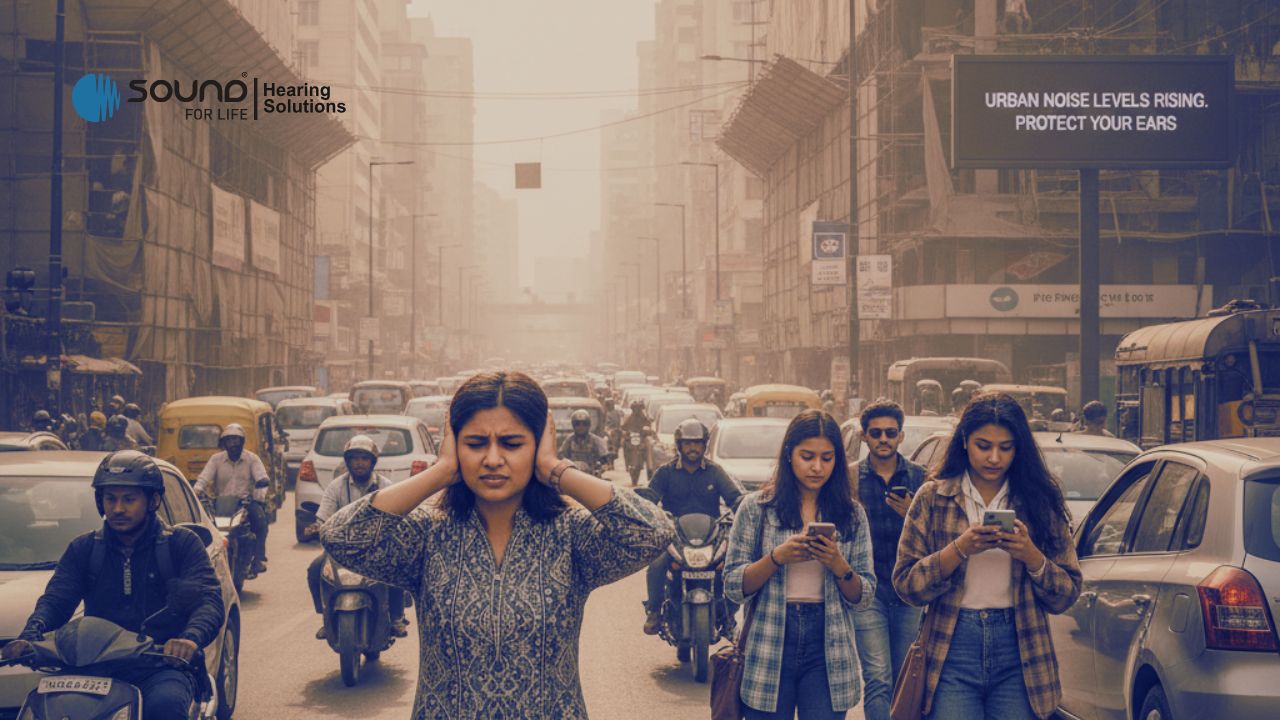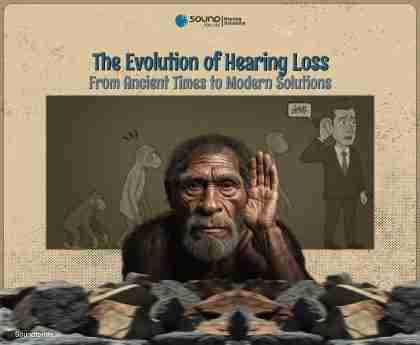Sound is what makes India’s cities unique. Delhi and Mumbai are busy and full of life, while Bangalore and Hyderabad are full of technology. The cacophony of a local market, the rhythmic roar of a Metro construction site, the persistent chorus of traffic horns, and the endless energy of cultural life. This is the urban soundscape we live in.
But over the last decade, this soundscape hasn’t just gotten louder; it has fundamentally changed.
As a young, rapidly developing nation, India’s cities are experiencing a surge in both continuous and intermittent noise that is quietly becoming a public health crisis for hearing. At SFL Hearing Solutions, we recognize that the greatest risk to your long-term hearing health isn’t just aging, but the environment you navigate every single day.
If you live in an Indian metropolitan area, your hearing is undeniably at risk. This comprehensive guide will help you understand the silent danger, spot the early signs of damage, and most importantly, take practical steps to protect your ability to hear for life.
1. The Shifting Symphony: Understanding India’s New Noise
The sounds of India have shifted from largely organic, street-level noise to persistent, high-decibel acoustic pollution generated by technology and infrastructure.
The Construction Cacophony
Across nearly every major city, whether it’s the expansion of the Metro rail in Chennai, new flyovers in Pune, or massive commercial developments, construction is continuous. Jackhammers, pile drivers, and heavy machinery generate noise that can easily exceed 100 decibels (dB). Living or working near these sites means daily exposure to damaging levels of sound.
The Digital Dissonance
The rise of the digital lifestyle has introduced personal noise pollution. Young adults commute, study, and relax with high-volume audio played directly into their ears via earphones. To drown out the noise of a crowded bus or a loud office, the volume is often pushed dangerously high, a primary contributor to premature hearing loss.
The Amplified Culture
While Indian festivals and social gatherings have always been loud, modern sound technology ensures they are much louder, often sustained over longer periods. Wedding processions, baraats, religious pujas, and clubs often use massive sound systems that expose listeners and nearby residents to dangerous sound pressure levels.
The Traffic Tension
Despite regulations, horn use remains aggressive and constant. A car horn measures around 110 dB. Prolonged exposure to this kind of intensity, even from inside a vehicle or near a busy junction, strains the auditory system and contributes significantly to noise-induced hearing loss.
2. Decibel Danger: How Urban Noise Causes Hearing Loss
Your ear is an incredible but delicate instrument. Understanding the decibel scale is the first step in protecting it.
The 85 dB Threshold
Audiologists universally agree that sound exposure above 85 dB poses a risk to hearing. This is roughly the noise level of heavy city traffic or a loud vacuum cleaner. The risk is determined not just by the volume, but by the duration of exposure.
| Decibel Level | Sound Source Example (India) | Safe Exposure Limit | Potential Impact |
| 85 dB | Busy Road Traffic, Auto-Rickshaw | 8 hours | Risk begins |
| 95 dB | Scooter or Motorcycle Engine | 4 hours | Significant risk |
| 105 dB | Metro Construction, Loud Music via Headphones | Less than 1 hour | High risk of damage |
| 120 dB | Firecracker or Loud Wedding Band | Only seconds | Immediate damage possible |
When you are constantly exposed to 90 dB or more, which is common for commuters in Indian cities, the tiny, sensitive hair cells in your inner ear (cochlea) become overstimulated and eventually die. This damage is permanent and results in sensorineural hearing loss.
Noise and Processing: The Hidden Damage
Even before a standard hearing test shows a measurable drop in volume sensitivity, noise exposure can damage the synapses, the connections between the hair cells and the auditory nerve. This is the mechanism behind Hidden Hearing Loss, where you can hear sounds, but you struggle to understand speech amidst background noise.
This subtle damage is why so many young professionals in India, despite having ‘normal’ audiograms, feel exhausted after a day of meetings or struggle in crowded chai stalls. They need a specialized hearing test to uncover this processing deficit.
3. Four Signals You Need an Audiologist in India Now
If your daily life involves navigating India’s loud soundscape, you need to be vigilant about changes in your hearing. Waiting is the biggest mistake you can make; permanent damage is preventable, but not reversible.
1. The Persistent Ringing (Tinnitus)
Tinnitus is the number one symptom of early noise-induced damage. It manifests as a ringing, buzzing, or hissing sound in your ear when it is quiet (like late at night). This is your ear’s warning system signaling distress. If you experience tinnitus after a loud event, it may be temporary, but if it becomes constant, it is time to see an audiologist in India.
2. Clarity Confusion, Not Volume Loss
You can hear the person talking across the table at a restaurant in Bandra or Hauz Khas, but you can’t make out the words clearly. You struggle to differentiate ‘fifteen’ from ‘fifty.’ This clarity confusion, especially with high-pitched sounds, is a classic sign that noise exposure has impacted the delicate processing functions.
3. Social Withdrawal and Avoidance
Are you avoiding social gatherings, family get-togethers, or noisy professional networking sessions because you find keeping up with the conversation is too exhausting?
Young adults often subconsciously withdraw to manage their undiagnosed hearing loss. This is not normal fatigue; it is auditory strain.
4. Over-Relying on Volume Controls
You are most likely trying to compensate for what you perceive to be a lack of clarity when you constantly turn up the volume on your phone, TV, or music, or when your friends and family constantly urge you to turn it down. Increasing the volume further aggravates your ears, creating an endless loop that speeds u the hearing loss.
4. Why A Specialist Audiologist is Essential in India
Self-diagnosis or postponing treatment due to a misguided sense of security, such as relying on a rudimentary online hearing test, is hazardous. You require an experienced professional with expertise in addressing the unique acoustic challenges of the Indian environment.
The Specialist’s Approach
An audiologist in India at SFL Hearing Solutions will conduct a comprehensive evaluation that goes beyond a standard audiogram. This includes:
- Speech-in-Noise (SIN) Testing: This test specifically measures your ability to understand speech when there is competing background noise, which is crucial for identifying hidden hearing loss, the kind caused by chronic city noise.
- High-Frequency Hearing Tests: When exposed to loud stimuli, hearing typically begins to decline, particularly affecting the ability to perceive higher-pitched sounds such as those used to hear birds chirping, children conversing, or distinct speech sounds like “s” and “f.” These specialised tests check your hearing at all frequencies, including ones that regular screenings don’t generally check. By detecting even minor fluctuations or declines in your high-frequency hearing, an audiologist can identify early signs of noise-induced harm and assist you in implementing preventive measures before the condition worsens.
- Otoacoustic Emission (OAE) Testing: This checks the noises made by the hair cells in your inner ear, which gives you a direct idea of how healthy they are.
Personalized Ear Care Tips and Solutions
An audiologist will create a personalised management plan that matches your unique hearing profile and the sounds of the environment you live in, whether you’re in a quiet suburb or a busy commercial neighbourhood so the recommendations, devices and day-to-day strategies fit your lifestyle and listening needs.
This might include sophisticated protective measures or advanced, discreet hearing technology to restore clarity.
If you notice any signs or feel any slight changes in your normal hearing, without further delay search for a reputable hearing aid centre near me that is focused on diagnostic excellence, not just selling devices.
5. Proactive Ear Care Tips: Your Urban Survival Guide
Protecting your hearing in India’s changing soundscape requires conscious, daily habits. Incorporate these practical ear care tips immediately.
Tip 1: The 60/60 Rule for Headphones
Follow 60/60 rules and keep your hearing at a safe level. You should never listen to personal audio devices at more than 60% of their maximum level, and you should only listen for 60 minutes at a time. If you need to listen longer, take a 15-minute ‘acoustic break’ every hour.
Tip 2: Invest in Noise Isolation
Ditch earbuds and upgrade to high-quality, over-the-ear headphones with excellent noise-cancelling (NC) features. NC technology dramatically reduces external noise, eliminating the need to increase the volume of your content to compete with traffic or train sounds.
Tip 3: Carry Ear Plugs
Keep a pair of reusable, high-fidelity earplugs in your bag or pocket. Use them strategically at:
- Loud cultural events or concerts.
- When using power tools or working in noisy environments.
- During long commutes on loud public transport.
Tip 4: Schedule Quiet Time
In today’s noisy world, our ears rarely get a real break. Try to intentionally set aside moments of complete quiet each day, even 15 to 20 minutes can make a difference. Step away from the television, turn off your phone, and sit in a calm space where you can simply relax. These quiet breaks allow your ears and auditory nerves to recover from constant stimulation, lowering auditory stress and easing temporary ringing or buzzing in the ears (tinnitus). Over time, building this habit can help you feel more refreshed, focused, and less sensitive to everyday noise.
Tip 5: Regular Check-ups are Essential
If you work in an industry with a lot of noise (such BPO, transportation, or hospitality) or live near a lot of construction, you need to have a full hearing exam every year. Early detection is the only path to successfully preventing the progression of hearing loss.
6. FAQs: Finding Clarity and Support in Your City
Q1: Is hearing loss from loud noise something that can be healed or reversed?
A: Unfortunately No. When very loud or prolonged noise damages the tiny sensory “hair cells” inside the inner ear (sensorineural hearing loss), that damage is usually permanent and can’t be reversed with today’s medical treatments.
Q2: What should I look for when picking a hearing aid clinic close to me?
A: Look for hearing aid centers that prioritize and focus on diagnostic testing first. Searched for a well established hearing aid centre near me that offers:
- Full diagnostic services, including Speech-in-Noise (SIN) testing.
- Where there are a wide range of modern, invisible, and feature-rich digital hearing aids (not just analog devices).
- Post-fitting service and auditory training programs.
Q3: If my basic online hearing test is normal, am I safe from noise damage?
A: Not always. Online screenings only look at basic volume levels. You could still have hidden hearing loss (Auditory Processing Disorder) or early high-frequency damage. Only a full, clinical hearing test performed by an audiologist in India can give you a definitive diagnosis.
Q4: Are modern hearing aids bulky and visible?
A: Today’s hearing aids are sleek, miniature, and highly discrete. Many are virtually invisible (IIC, Invisible-in-Canal) or are tiny, stylish devices that sit behind the ear (RIC, Receiver-in-Canal). They are designed to blend into the modern professional lifestyle.
Q5: How often should I have my hearing checked?
A: If you’re a young adult who is regularly exposed to loud noises (such on your daily commute, at work, or when you wear headphones), you should have a comprehensive diagnostic hearing test once a year as a precaution and as part of your general ear care advice. If you detect any rapid changes or ringing in your ears, make an appointment right once.
The noises of our cities are a big part of what it means to be Indian, but they shouldn’t hurt your hearing health in the long run. The only way to make sure you can keep enjoying the lively soundscape of the future is to know what the risks are and take action now.
You may change the course of your hearing now.
Call SFL Hearing Solutions at +91 90 1540 1540 to set up a free hearing test.
Disclaimer: This information is for educational purposes only. For personalised guidance, please see a trained audiologist in India.





